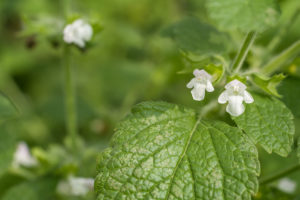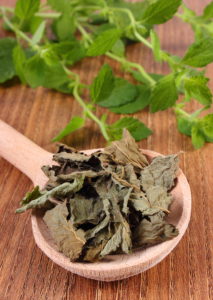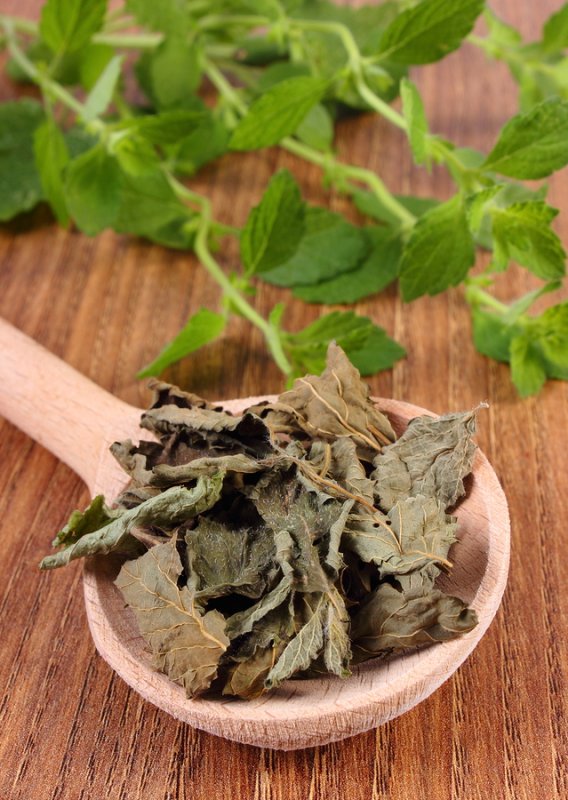Table of Contents
Lemon Balm (Melissa officinalis) is native to the Mediterranean region. And has been cultivated for well over 2,000 years. Melissa officinalis (Melissa is derived from the Greek for ‘honey bee’) was observed by Pliny the Elder as great for attracting bees.
Lemon balm’s appeal continued to grow. It was used as a tea to combat mental confusion, and as an elixir to extend lifespan. In the 17th century, French Carmelite nuns dispensed Carmelite Water. This lemon-balm infused ‘miracle water’ was said to improve memory, vision, and reduce fever, melancholy and congestion.
Melissa tea is used in France today to treat fatigue and headaches. Naturopaths recommend lemon balm to treat cold and flu, lower blood pressure, for insomnia and indigestion.

As a nootropic, lemon balm is used primarily to lower anxiety and boost memory.
Lemon Balm helps:
- Neurotransmitters. Lemon Balm affects brain levels of acetylcholine (ACh). It plays an inhibitory effect on acetylcholinesterase (AChE). AChE is an enzyme that breaks down ACh. Improving memory and cognition.
- Neuroprotectant. Lemon Balm is a potent antioxidant that protects your brain cells from free radical damage.
- Anxiety and stress. Lemon Balm has a significant anxiolytic (anti-anxiety) effect. It raises brain levels of the neurotransmitter GABA by inhibiting the enzyme GABA transaminase. This has an effect on mood regulation.
Overview
Lemon Balm (Melissa officinalis) is an herb that’s native to the Mediterranean region. And now found in gardens throughout Europe and North America.

Lemon balm has a long history as a treatment for stress, anxiety, thyroid issues, indigestion, infections, viruses and inflammation.
Related to the mint family of herbs, lemon balm has a subtle lemon scent. And its small white flowers attract bees. Hence the botanical name ‘Melissa’, which is Greek for honey bee.
The first recorded medical use of lemon balm dates back to Dioscorides, the ancient Greek physician, who used the herb for its anti-bacterial and soothing properties. The famous Swiss Renaissance physician, Paracelsus, called it the “elixir of life”.
In the 16th century, English botanist John Gerard, gave it to his students to “quicken the senses”. This appears to be the first recorded use of the herb for brain and cognitive health.
The most recent research shows lemon balm has remarkable healing and regenerative effects on your brain. It stimulates memory, and supports the health of your brain’s white matter.
Lemon balm’s two primary compounds that affect brain health are eugenol and rosmarinic acid.[i]
Eugenol is an antioxidant 5-times more potent than alpha-tocopherol found in Vitamin E. So lemon balm acts to boost your body’s natural healing processes by eliminating free radicals that damage brain cells.
And lemon balm helps increase levels of your body’s most powerful built-in antioxidants, dismutase and glutathione peroxidase.[ii]
Rosmarinic acid promotes an anti-depressant effect in your brain by downregulating mitogen-activated protein kinase phosphatase-1 (Mkp-1). And it upregulates brain-derived neurotrophic factor (BDNF), along with boosting dopamine synthesis.[iii]
How does Lemon Balm work in the Brain?
Lemon Balm boosts brain health and function in several ways. But two in particular stand out.
- Lemon Balm boosts memory. Lemon balm increases the activity of the neurotransmitter acetylcholine (ACh) in your brain. When your brain sends signals, it uses acetylcholine to keep the signals moving. But once used, your brain removes acetylcholine with an enzyme called acetylcholinesterase (AChE).[iv]
But if you have too much AChE, as is the case with Alzheimer’s patients, it restricts brain signaling. One way to prevent this signal failure is to prevent the breakdown of acetylcholine.
The compound rosmarinic acid in lemon balm encourages blood flow, which helps to keep brain cells from dying.[v] And it inhibits the formation of AChE.
The result is that your brain is stimulated, memories continue to form, and brain fog is eliminated.
- Lemon Balm reduces stress. One-way lemon balm does this is to promote GABA, a glutamate inhibitor in your brain. Glutamate excites brain cells to act. While this excitation is necessary, too much glutamate results in cell death.
Lemon balm promotes a better balance in glutamate levels, and helps new cell growth.[vi] The result is a boost in memory and reduction in stress. Largely due to eugenol, one of the components of lemon balm.
How things go bad
Chronic stress, anxiety, poor blood flow and free radicals (oxidation) can damage your brain. And one of the ways this manifests is memory loss.
It comes as no surprise that people with memory loss experience higher rates of anxiety and depression. As verified in one Australian research study.[vii]
↓ Chronic stress reduces memory capacity
↓ Toxins kill brain cells from the inside
↓ Free radicals destroy neurons and synapses
↓ Acetylcholine (ACh) levels decline
↓ Brain-derived neurotrophic factor (BDNF) declines
Under conditions of chronic stress your brain loses the capacity to transmit signals between neurons efficiently. Memory, cognition, and decision-making all suffer as a result.
Lemon Balm benefits
Lemon Balm undoes damage to the brain caused by chronic stress and oxidative damage. It boosts GABA levels and keeps toxic glutamate overload in check.
Lemon balm inhibits the enzyme AChE that breaks down acetylcholine (ACh) levels in your brain. Boosting ACh improves memory, recall and cognition.
Rosmarinic acid in lemon balm works as an antidepressant. And boosts brain-derived neurotrophic factor (BDNF) which promotes the growth, maturation and maintenance of brain cells.
And the eugenol in lemon balm is a very powerful antioxidant. Eliminating oxidative damage in brain cells by neutralizing free radicals. And boosting your brain’s own antioxidants to provide even more protection.
How does Lemon Balm feel?
The effects of supplementing with Lemon Balm (Melissa officinalis) can provide an anti-anxiety effect within minutes of taking it. Some users say it works as well as popping a Xanax®.
You should experience an increase in focus along with a sense of calm. And even though lemon balm works well as a sleep aid, taking it during the day shouldn’t make you drowsy.
Users report lemon balm effective in taming racing thoughts that come with Obsessive Compulsive Disorder (OCD). Some even use lemon balm as an effective way to control irritable bowel syndrome (IBS).
Lemon Balm Clinical Research
Research continues in medicinal plants and herbs that have been used for millennia to treat cognition and memory problems. One study conducted at the University of Newcastle upon Tyne in the UK, found Melissa officinalis to be one of the strongest in effects on acetylcholine receptors. And being an effective aid for memory.[viii]
Lemon Balm as a Nootropic
Lemon Balm has been shown to improve problem-solving and memory in both human and animal models. And age seems to make no difference. All groups using lemon balm showed boosts in recall and problem-solving.
Some recent studies with Alzheimer’s patients have shown improvement when using lemon balm. In one study done in China, researchers gave Sprague Dawley rats eugenol.
One of the active compounds found in lemon balm, eugenol is a potent antioxidant. In this case it helped test subjects get their memory back.[ix]
Another study noted that lemon balm inhibits acetylcholinesterase (AChE). This enzyme breaks down the critical neurotransmitter acetylcholine (ACh). ACh is crucial to creating memories and cognition. Lemon balm was shown to boost and support mood and memory.[x]
Lemon Balm for Stress Reduction
A double-blind, placebo-controlled experiment was conducted in the UK with 18 healthy volunteers. The subjects received two separate single doses of standardized lemon balm extract (300 mg and 600 mg), or a placebo, on separate days. Followed by a 7-day washout period.
Mood was assessed before dosing, and 1-hour after dosing with lemon balm extract. The study subjects did a 20-minute version of the Defined Intensity Stressor Simulation (DISS) battery of tests.
The results showed that a 600 mg dose of lemon balm eliminated the negative mood effects of doing the DISS tests. They reported an increase in calmness and they were more alert.
The researchers also reported a significant increase in mathematical processing, with no reduction in accuracy. This was after taking the lower 300 mg dose.
The nootropic benefits of lemon balm, according to this test, was a boost in cognition, and had a calming effect.[xi]
Lemon Balm Recommended Dosage
Lemon balm has a long history of use in treating a host of ailments. Including memory and cognition, gas, bloating, earache, vomiting, headache, toothache and insomnia.
 For nootropic use, Melissa officinalis (lemon balm) comes in tea and capsule form. For the most potent dosage find lemon balm extract capsules.
For nootropic use, Melissa officinalis (lemon balm) comes in tea and capsule form. For the most potent dosage find lemon balm extract capsules.
The suggested dose by most naturopaths and alternative health doctors is 300 mg of lemon balm extract 2-3 times per day.
Dosage of lemon balm leaf as a tea is 1 – 2 grams per cup of tea.
You can use lemon balm in the morning to address daytime anxiety. And towards evening to support relaxation and sleep.
Lemon Balm Side Effects
Lemon balm is considered non-toxic and very safe for most users. Most neurohackers won’t experience any side effects.
Note: Lemon balm may have an “antithyrotropic effect“. So if you’re hypothyroid, and on thyroid medication, you may want to avoid using lemon balm.
And use caution when combining lemon balm with; anti-anxiety meds, anti-histamines, muscle relaxers, anti-seizure drugs or tranquilizers.
Type of Lemon Balm to buy
For nootropic use, lemon balm supplements are available as loose-leaf tea, tinctures, and capsules. Most neurohackers use lemon balm capsules which come as ground leaves, or an extract.
The lowest active dose is 300 mg of standard lemon balm. Supplementing above this dose seems to offer dose-dependent benefits. In other words, you’ll get more benefit by taking higher doses. (i.e. 300 mg lemon balm 2-times per day).
Nootropics Expert Recommendation
Lemon Balm extract 300 – 600 mg per day
 I recommend using Lemon Balm as a nootropic supplement.
I recommend using Lemon Balm as a nootropic supplement.
Your body does not make Lemon Balm on its own. So you must take it as a supplement.
Lemon Balm is especially helpful for those suffering from anxiety and stress. Studies show it helps stop and reverse the devastating effects of anxiety and stress on your brain, and body. This nootropic helps repair damage to brain cells caused by chronic stress and anxiety.
Lemon balm is reported to work well for those dealing with Obsessive Compulsive Disorder (OCD). Taming racing thoughts, and helpful in dealing with stressful situations.
Lemon balm is also helpful for those suffering from Alzheimer’s. It has been shown to help reduce agitation and improve symptoms of mild to moderate Alzheimer’s disease. It may also be of benefit in relieving some symptoms of ADHD.
You can safely take up to 900 mg of Lemon Balm (Melissa officinalis) extract daily if needed. One dose first thing in the morning. One dose early afternoon. And the last dose in the evening.
And for memory, lemon balm is great to stack with CDP Choline and Acetyl L-Carnitine.









Join The Discussion - 187 comments
Jman
August 22, 2022
Hello David. Thank you for a great site.
I’m currently taking Saffron and Rhodiola. Do you think I can take Lemon Balm together with those two?
David Tomen
August 23, 2022
Yes
david
August 21, 2022
Hello, what do you think about NSI-198?
David Tomen
August 21, 2022
David, I think there is not enough information available on NSI-198 to make an educated opinion. The company that developed it nearly went broke and ended up selling it to an undisclosed buyer not too long ago.
Dani
June 5, 2022
Sorry, one other question. Is lemon balm safe for people with glaucoma? I read that it may increase eye pressure.
David Tomen
June 5, 2022
Dani, Lemon Balm may decrease the efficacy of glaucoma medications. There have not been any clinical studies proving this. This is just an observation of one of the potential side effects.
Dani
June 5, 2022
Is this safe when using an SSRI antidepressant? or can it cause serotonin syndrome?
David Tomen
June 5, 2022
Dani, Lemon Balm is a GABA transaminase inhibitor. And SSRI’s work on the serotonin system. Two different systems in your brain so they should not be contraindicated.
MattD
May 13, 2022
If anyone is looking for a good Lemon balm I recommend Gaia Herbs in the dropper bottle (purple label). Stuff is VERY potent and I can say it is very effective. Been using it for a while now and I don’t even use anywhere near the recommended serving. It’s too much in my opinion. I’ve tried a few different dry powder extracts and they’re not even close in terms of potency to this liquid extract from Gaia. It is very fast acting.
Sonia
April 10, 2022
Hi David!
Should I buy Lemon balm 4:1 or 10:1 extract? What ratio do you use in your Lemon Balm?
David Tomen
April 10, 2022
Sonia, I use the 10:1 extract (https://amzn.to/37w77g6) and it works for me.
Sarah
January 27, 2024
Just curious with this brand because it says it contains stearate. I don’t know much about it
David Tomen
January 28, 2024
Sarah, I’ve since switched to this brand because it does not contain any stearates. https://geni.us/VOoC5io
Chris
March 28, 2022
Hi David Tomen,
I am trying to find a source for an undergraduate research paper I’m writing.
Where can I find the source for “The most recent research shows lemon balm has remarkable healing and regenerative effects on your brain. It stimulates memory, and supports the health of your brain’s white matter,” from your Lemon Balm page?
I am interested in the part about lemon balm boosting the brain’s “white matter.”
Thanks,
Chris
David Tomen
March 28, 2022
Chris, this is one example of Lemon Balm increasing “white matter: https://www.ncbi.nlm.nih.gov/pmc/articles/PMC5241506/. See the part that says “increase of myelin diameter, and up-regulation of myelin basic protein”.
White matter shows up primarily as the myelin sheath around axons.
Chris
March 29, 2022
Thanks!
Chris
March 29, 2022
David,
Do you have any sources showing how effective Lemon Balm is at supporting the brain’s white matter without coadministration of dexamethasone? Or, with coadministration of any non-prescription OTCs?
–Chris
David Tomen
March 29, 2022
Chris, you can do the search yourself using the keywords “Lemon Balm AND myelin” and see what turns up. You’ll get the same results as I do if I spend the time searching for it.
Chris
March 29, 2022
Thanks,
The source you sent seems the best. It gives results for Lemon Balm only and results for combinations. It looks promising.
–Chris
Jman
February 21, 2022
Some reports of it causing withdrawals. Thoughts?
David Tomen
February 21, 2022
Jman, I just had this same conversation with someone in the Ashwagandha comment thread. Suffering from withdrawals symptoms from abruptly stopping Lemon Balm is rare. But I’m sure it happens to some people. I’ve never experienced it.
Jman
February 22, 2022
Thanks. Do you think a taper of it will be better?
David Tomen
February 22, 2022
Jman, it depends on your system. I don’t need to taper off Lemon Balm when I stop using it. But I’m sure some do need to taper off.